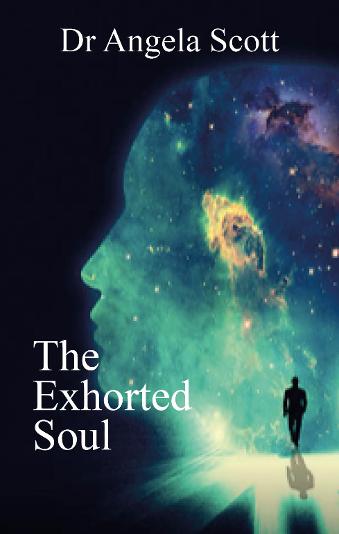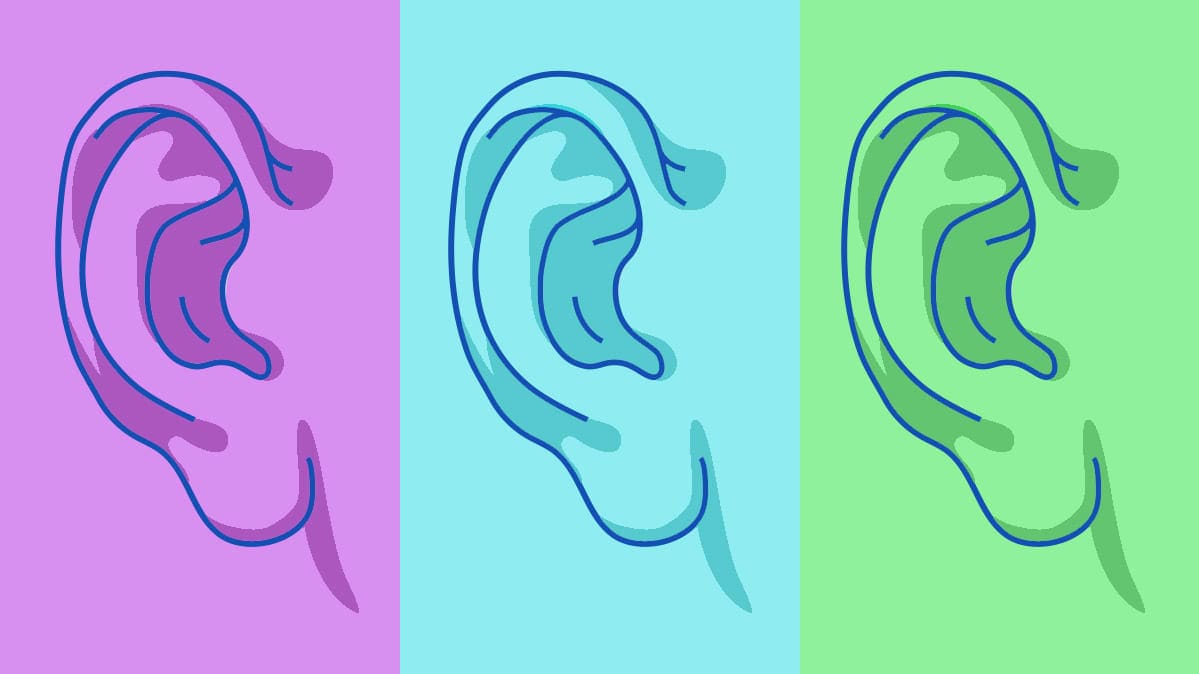The Ear
He that hath ears to hear, let him hear. Matthew 11.15(KJV)
21st October 2019
The Ear, a feature of the face that is the organ of hearing and, in mammals, balance. In mammals, the ear is usually described as having three parts—the outer ear, the middle ear and the inner ear.
Outer Ear - The external part of your ear consists of the pinna and ear lobe. The pinna is the shell-like part of your external ear, and is made of cartilage and skin. It directs sound waves from the outside into your external auditory canal (ear canal), which in turn channels sound waves to the tympanic membrane (also known as the ear drum). The tympanic membrane is a thin, semi-transparent membrane that separates the outer and middle ear.
Middle Ear - The middle ear is an air-filled space that contains 3 tiny bones (known as ossicles), called the malleus (hammer), incus and stapes (stirrup). Sound waves that reach the tympanic membrane cause it to vibrate. This vibration is then transmitted to the ossicles, which amplify the sound and pass on the vibration to the oval window (a thin membrane between the middle and inner ear).
Inner Ear - The inner ear can be thought of as two organs: The cochlea which serves as the body's microphone, converting sound pressure impulses from the outer ear into electrical impulses which are passed on to the brain via the auditory nerve. The other organ is the semicircular canals which serve as the body's balance organ - Our Equilibrium. The vestibular or the balance mechanism is an important part of the inner ear as it registers the body's movements, thus ensuring that we can keep our balance.
For this blog, the ear will retain its three parts but will be viewed as what we causally hear, (The Outer Ear) what we process (The Middle Ear) and then believe (Inner Ear)
The Outer Ear
What do you causally hear?
Morning - The builders across the road, the News, your household getting up and moving around, the news. Now, depending on the way you travel to work or to drop the kids off at school. You may hear traffic, other peoples' music, other peoples' conversations.

At Work - What do you causally hear? Is it gossip? the sound of computer keys? the sound of your boss voice? There are a host of sounds we subject our ears to. Have you considered the types of sounds you would rather hear? On our arrival home what are the sounds do you hear? The news, the children, what do they say? What does your partner speak about most often?
During the evening - What are you listening to? The news? What do you 'relax' to? What is the genre? What is playing in the background? What do you process from all the causal sounds that you hear? Most of it.
Jessica Andrus author of an article published in the Hearing Institute, named 'We don't hear with our ears, we hear with our brains'. states that 'The ears just deliver the appropriate sound signals to the auditory portions of the brain. It is up to the brain to make a coherent message with those sound signals; this is called auditory processing. Auditory processing, she goes on 'is a natural process of taking in sound through the ear and having it travel to the auditory and language portions of the brain to be interpreted (processed). Auditory processing depends on the signal being delivered with fidelity (job of the ear), and the brain being able to process those signals.
Above we spoke about hearing the builders across the road, the sound of the builders told you that you was 'at home' and that the world was not ending, the sky had not fallen to earth. It also reminded you that the neighbour had told you that she was going to have some work done this month. You heard the News and kept that head line of a stabbing in your mind, here you wondered if you will be safe or if the incident related to a teenager, you considered if your teenager would be safe, going and coming from your home. The sounds of your household afforded you the knowledge that everyone was well. You hear another News headline stating that the crime rate has gone up in your area. You wonder if you and your family will be safe living where you do. You travel to drop the children off at school and hear, as you pass a huddle of mums, that the head teacher Mary Jones may be leaving. You consider who will take her place and whether your children will be as well looked after as this head teacher had cared for your children. You travel on public transport and hear the music coming out of the earphones of a passenger sitting two rolls behind you, you wonder if their ear drum is safe or damaged and note that the sound is distracting. Back home 'sounds' of your household should bring comforting feelings (believe it or not) You are home, you are in a familiar place and depending on your home environment you should feel safe. Do you hear what your children say to you or are they passing 'sounds'? Do you hear what your partner has to say, or do you feel they are also casual sounds which of course, you will process later? Your evening does not end there, you are surrounded with sounds, if you live alone, there may be sounds from the neighbours, the cars passing by and most importantly what you choose to listen to, is it the news again? Is it a particular type of music or maybe something inspirational? Do you keep those chosen sounds playing in the background? All causal sounds are being processed whether we react to them or not.
Maybe we take our causal hearing for granted, not realising that most of the sounds we hear are processed as they are comforting to us, they remind that we are safe, they remind us that we are in a familiar environment. Imagine if you was on the way to work and heard an elephant roar! Not sure how I would process that sound. Then there are those sounds that are not severing us any purpose....for example having the news on as 'background noise'. This background noise, as we saw above, had us wondering whether we would be safe in our homes and community. Consider what you expose your ears to, as mentioned above there are some environmental sounds that are unavoidable and will be processed once heard.
Middle Ear
Once we 'hear' a sound, we process them, there is a four step process according to (Cochlear Americas, 2009; Johnson et al., 1997; Nevins & Garber, 2006; Roeser & Downs, 2004; Stredler-Brown & Johnson, 2004)
Step 1: Auditory Awareness - Here we detect and locate the sound. We then decipher whether the sound needs urgent attention and block out other sounds in the background.
Step 2: Auditory Discrimination - Here we sort the environmental sounds, detect differences in non-phoneme aspects of speech including rate, intensity, duration, pitch, and overall prosody and between specific speech sounds.
For most us, gratefully, will have 'hearing' experiences to recall, as we are constantly listening and deciphering what to react to and what we can discard. One of my listening and hearing experiences come from the fact that I was a single mother. I had to have an 'ear out' to most sounds in and around my home. At nights I would be able to tell you, who got up and went downstairs for a drink of water, who went to the toilet and for how long. It is a wonder how I slept as I had to decipher every sound in-order to ensure my children were safe. One night I could hear the clock ticking in one of the childrens' room , however it sounded a little strange, on investigation someone had taken the clock from the wall on which it hung and placed it on the mantle piece. The clock was lower than it was originally and therefore 'sounded' different. It just shows how intently I listened and my ability to distinguish sounds. The reason for this example is to alert you to the fact that you are listening even when you are unaware that you are hearing. For this reason one should be aware of the environment they enter. Are you conscious of what or who you expose your ears too?! Maybe you do not, and does it matter? When you become aware that you are soaking up the environment with all its sounds and smells, you will ensure that you are careful or mindful of what you consciously listen to and minimising any contact with environments that does not serve you.
You may not have considered just how much you hear, this blog hopes to alert you to the process of hearing in the hope that you spend a minute to consider what you expose yourself to.
Step 3: Auditory Identification – Is the ability to attach meaning to sounds, speech and to self monitor, here we have the ability to change speech production based on information we get from hearing ourself speak.
As parents and in some professions, ones voice is paramount to ensure that you are heard. As a mother I know that when I use a certain tone, my children know to immediately stop any undesired behaviours. In certain professions one may need to 'take control' and use their voice to do this. The ability to make and acknowledge such commands can be vital to the person it is directed to and the person making the command. Another mother example...One of my children had chronic asthma and I had developed the art of distinguishing his coughs, I could even tell if he needed more medical intervention whilst over the phone. Most of us have this ability and use it without thinking, we use our ability to identify sounds, for example, when out walking and we wish to cross a busy road, we know when it is safe to cross as we hear the beep beep beep of the traffic lights. As a driver we know to make room when we hear a siren coming our way. There are also sounds that make us feel uneasy as we are aware that they could mean danger, like crossing the road between parked cars! Having the ability to identify sounds, again keeps us safe and enables us to comfortably communicate with others.
Do you consider how you speak to the people around you? Most have a work voice and attitude. The people at work are spoken to with respect and with an 'inside voice' some of us morph into roaring lions once we sit behind a steering wheel, many revert back to caveman times when they speak to the people in their household. Are you conscious of the tone and volume of your voice when interacting with others? Are you conscious of how you are portrayed when you open your mouth? Are you self mentoring?
Step 4: Auditory Comprehension and Memory - This is the ability to understand longer auditory messages, including engaging in conversation, following directions, and understanding stories. The ability to fill in the blanks when auditory information is missing. The ability to retain auditory information both immediately and after a delay. The ability to interpret, retain, organise, and manipulate spoken language for higher level learning and communication.
Consider how you process the casual information you hear. Do you ponder on things you hear? Does those casual thoughts linger for a minute and then its gone, you leave it? Perhaps certain things take days to mull over? Or are you the type to consider casual information over a period of a month? DrScott@loveliveholistically.com Take a minute to think about the way you process the things you hear. I understand that we take the appropriate time and effort to process information that is given specifically for a response but many of us grab onto any and everything that has been thrown out casually. Often times many of those casual sounds and utterances are not for us, but we attach meaning to them and spend valuable time and energy processing information that should be left where it was heard. Be aware of what you hold on to that should have been disregarded. If you are having difficulties 'letting go' please contact me DrScott@loveliveholistically.com

Inner Ear
As in Step 3 above - Auditory Identification which is the ability to attach meaning to sounds and speech. The Inner ear is portrayed in this blog as what we do with the processed sounds and utterances we are exposed to. We attach meaning and begin to believe them. As mentioned earlier the sounds we hear helps us to feel safe, know where we are and alert us to any impending dangers.
Annie Duke states in an article titled 'Why Your Brain Clings To False Beliefs (Even When It Knows Better)' before language, our ancestors could form new beliefs only through what they directly experienced of the physical world around them. For perceptual beliefs from direct sensory experience, it’s reasonable to presume our senses aren’t lying. Seeing is, after all, believing. In fact, questioning what you see or hear can get you eaten. For our evolutionary ancestors, it was better to be safe than sorry, especially when considering whether to believe that rustling in the grass is a lion. Annie Duke goes on to outline how we form abstract beliefs:
-
We hear something; (This blogs' Outer ear process)
-
We think about it and vet it, determining whether it is true or false. (This blogs' Middle ear processing) only after that
-
We form our belief. (This blogs' Inner ear process)
There are certain sounds and speech that we not only process, but we begin to believe, whether they are true or not. Have you ever been in a situation in which you 'believed' a certain thing is going to happen, only to be surprised when it did not happen? Looking back you realise that you either put yourself through unnecessary stress or reacted in such a way as to cause another person stress, pain or worst? As we grow spiritually we are to take a minute and consider what we have casually heard is in fact true, then consider how to react. In doing so, it gives us enough time to listen to our intuition and come to a thought out conclusion.
Harvard psychologist Daniel Gilbert (1991) states that “People are credulous creatures who find it very easy to believe and very difficult to doubt. In fact, believing is so easy, and perhaps so inevitable, that it may be more like involuntary comprehension than it is like rational assessment.”
What are you believing that has no substance? Difficult question to answer, when you may believe something to be true. I do not want to go down the road of what your parents told you as a child, that had no substance but you carried it into adult life, or what the school bully called you, or the put downs that you have endured from the people you have in and around your life. The above will need a few 'sessions' to overcome. I am talking about the casual utterances that you hear and begin to believe ..Have you ever been in a meeting and one of your ideas gets shut down in a few sharp casual words? Then you took it personally and began to believe what was said? Have you been with a group of friends and one of them said something quite casual, that you felt 'hit home' or resonated with you, you then began to believe what was said and attributed it to yourself as a flaw. Lets have a quick look at what we watch, either on TV or social media. Is the fashion world casually telling you that you should look a certain way...Is society telling you, oh so casually, that at your age you should be doing this or have that? In the back of your mind you thrive to fit in, and may absorb those messages that tells you that you are not where and what you should be......That could be taller, shorter, slimmer....You should be eating this and stop eating that. All these messages are processed by you over time and may become a belief.
The Inner ear includes The vestibular or the balance mechanism. How balanced do you feel when what you hear, digest and believe is ever changing? Our equilibrium is essential for a peaceful happy life. Are you often swayed by what you have heard, whether this is a sound or an utterance? Lets go down scenario lane for a minute... You live alone and you hear a sound downstairs, you begin to worry, it is rather windy outside.....But you are convinced that someone is trying to get your house.....You conjurer up enough courage to go and check, you find that no one has been trying to get in....But you have convinced yourself that there must have been someone trying to get in...You go back to bed but do not sleep...You've frightened yourself. Our mind is a powerful part of our being add sound and you have a mixture for negativity or positivety. What other things have you convinced yourself are true when in fact they are not? Do you find that it is more negative things you attribute to being true about yourself or they more positive in nature? DrScott@loveliveholistically.com Imagine how you would feel if more of the things you believed about yourself were positive? You are aware of the quotes 'As a man thinketh so is he' Proverbs 23:7 Remember what you think of yourself you become. Not all sounds and utterances are to be acted upon.
Conclusion
The Ear is a feature of the face that is the organ of hearing and, in mammals, balance. The ear is usually described as having three parts—the Outer ear, the Middle ear and the Inner ear. This blog retained the ears' three parts but was viewed as what we causally hear, (The Outer Ear) what we process (The Middle Ear) and then believe (Inner Ear)
The Outer Ear - The external part of your ear consists of the pinna and ear lobe. It directs sound waves from the outside into your external auditory canal. The casual sounds and utterances we hear, affords us a huge amount of information, letting us know we are safe, that our household is safe (Parents, remember hearing that key turn in the door when your teenager is an hour past their curfew?) We may take these familiar sounds for granted, and should be grateful when we awake to hear our household coming alive. The there are the casual sounds that do not serve us any good purpose, exposing your ear to news headlines that have you wondering whether you and your family will be safe in your homes or community are not productive. Gossip does no one any good, unless you are going to help the person at the centre of the gossip. Listening to social media that tells you that you are less than, again serves you no good purpose. Our working day has us absorbing all types of sounds...I asked if they are the types of sounds you want to hear. As you return home we considered the sounds we encounter there....Are they mostly pleasant or unpleasant? What can you do to minimise unwanted sounds?

Middle Ear - We then looked at what happens to all those casual sounds that have entered our external auditory canal (ear canal), which in turn channels sound waves to the tympanic membrane. They are all processed. A four step process was given which included Step 1: Auditory Awareness, Step 2: Auditory Discrimination, Step 3: Auditory Identification, Step 4: Auditory Comprehension and Memory. This unique process allows us to Detect and locate sound, like the clock that was removed from its wall and placed in in a different place in my childrens' room. This sage of the auditory process allowed me to decipher what sound needed urgent attention like my sons' cough, even though he was over the phone, as I was able to block out other sounds and listen. One would believe, that as we have the ability to 'hear' ourselves we would at times, listen to ourselves. There are some of us that do not speak to our nearest and dearest with care and respect, and save our inside voice for our work colleagues. We have the ability to use our voice to make commands and to sooth. I remind you that we should be mindful of the sounds we make that are directed at others. Step 4 of the auditory process dealt with how much time we spent on what we have heard and wondered if these casual sounds and utterances were mulled over and kept in our memory far longer than they needed to be.
Inner Ear - Annie Duke reminded us of this blogs theme when she outlined how we form abstract beliefs: We hear something, We think about it and vet it, then we form our belief. Daniel Gilbert alerted us to the fact that as credulous creatures we find it difficult to doubt and so easy to believe. As this blog was about how much casual sounds or utterances we absorb. I asked you to consider what you have been believing that had no substance and how balanced you felt your life is, given the amount of sounds and utterances we hear, digest and believe in a day.
The aim of this blog was to alert you to the fact that as we carry on with our daily life, we are exposed to the many sounds and utterances that our environment offers, sounds that are comforting and reassure us that we and our family members are safe and well. Other sounds that 'make us ' feel upset, frightened or at threat of danger. Being aware of what we absorb everyday, will ensure that we remain grateful and alert us to anything that may upset our equilibrium.
If you have enjoyed my blog and would like to contribute to its continued help and guidance to others, please donate. All donations gratefully received and appreciated.
Check Out For My New Book






